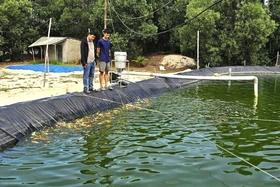{title}
{publish}
{head}
For nearly two decades, the Employment Permit System (EPS) has facilitated the placement of hundreds of workers from the coastal province of Quang Tri into stable jobs in South Korea’s fisheries industry.
EPS is implemented in August, 2004 to help small and medium sized companies solve their labor shortages. It allows employers who have failed to hire native workers to legally hire an adequate number of foreign workers.

The Quang Tri’s Employment Service Center instructs local workers about requirements for working in South Korea’s fisheries industry.
Nguyen Cong Dong, born in 1982 in Xuan Tien Village, Gio Viet Commune, Gio Linh District, passed the fisheries profession exam in 2010. Currently residing in Mokpo City, Jeollanam-do Province, Dong earns around KRW5 million (US$3,500) per month. His income include basic salary of KRW2.5 million/month and the remaining paid by the boat owner based on his skills, experience, and productivity.
With 14 years of maritime experience and a dedicated and responsible work ethic, Dong has secured an E7 visa (the E7 visa is for foreign professionals (E7 Foreign National of Special Ability Visa) who have a contract to do specialized work in South Korea), allowing him to legally work in South Korea with a two-year extension from the boat owner. This visa also enables family visits, and recently, Dong’s eldest daughter began studying vocational courses in Korea.
Dong shared that his previous experience on offshore fishing boats made his work in South Korea more manageable. Initially, he worked on near-shore fishing boats to get accustomed to the job. After two years, he moved to offshore fishing boats, focusing on catching croaker and white pomfret. Dong is currently working on a fishing boat with over 300 horsepower. The boat has 10 crew members, including two Vietnamese workers, Koreans, and Indonesians. On average, the boat goes on two trips per month.
Korea’s fisheries industry benefits from machinery that alleviates the physical burden, contrasting with the more labor-intensive fishing in Dong’s hometown. Each crew member has specific tasks, like operating net machines, handling buoys, pulling ropes, removing fish from nets, washing fish, and storing them. This organized, assembly-line approach boosts efficiency and reduces labor strain.
In Quang Tri, the Quang Tri’s Employment Service Center oversees the registration for the EPS program. Since May 2005, it has been sending workers to South Korea’s fisheries sector. The program is popular due to relatively low costs, around VND30-40 million ($1,200) and a refundable VND100 million deposit against illegal labor migration. Workers earn a minimum of VND37 million ($1,450)/month.
To date, 745 out of 2,805 workers in the province have gone to South Korea for fisheries work. In 2024 alone, 438 workers registered for this profession, and 210 passed the exam, with 30 already departing for South Korea.
To promote the program, the center disseminates information to workers, especially in coastal areas. It organizes job introduction seminars and home visits to directly inform and guide workers. Additionally, it cooperates with the Provincial Social Policy Bank to publicize loan policies and support for workers abroad.
However, there remains a challenge that most workers going to South Korea under the EPS program are unskilled. Many have limited professional skills, communication, and foreign language proficiency. Hence, some workers face difficulties due to language barriers and the demanding work, particularly in the fisheries industry, which requires physical strength and endurance.
This is the main reason why some workers become disheartened and leave to find other jobs, becoming illegal residents. Therefore, besides disseminating information and facilitating job opportunities under the EPS program, the center focuses on raising workers' awareness to minimize legal and contractual violations.
The center also stresses the importance of Korean language training to equip workers with necessary communication skills. They also emphasizes strict administrative sanctions for labor contract violations (illegal residence after contract expiration) as per Decree 12/2022/ND-CP. To effectively implement communication and enforcement, it’ necessary to boost coordination among local authorities in managing workers abroad.
Thuy Ngoc – Linh Pham

QTO - In Quang Tri, clean agricultural stores may not flaunt flashy signs or wide storefronts, but they are quietly becoming trusted places where consumers...

QTO - In a quiet village in central Vietnam, Le Minh Duc, 26, has turned his passion for ornamental fish into a promising startup, the first Koi breeding...